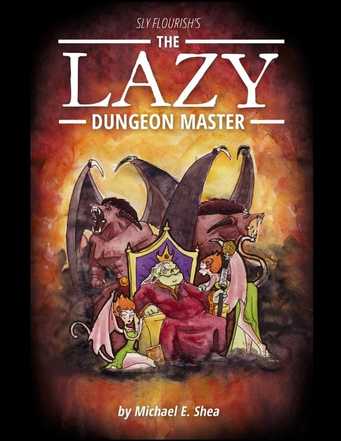 Click through the picture to purchase! Click through the picture to purchase! I am not the most organised of people, but paradoxically, I love to plan things. I have lists of lists, and this boils over into my GM'ing. I have maps, neighbourhoods, countries, continents, all drawn up in my head. I recently had to come to terms with the fact that I was possibly doing too much. I was working like mad, and my games were, arguably, not better. I had to take a *deep* breath... and let go. These are the 5 ways I (at least try to) do it 1) Let The Players Do the Walking: If you have a chatty group, you'll never need more than a few bullet points for your adventure. Ask them. As in, ask them everything. What does this building look like? What can you see? For example, your clue is a shard of glass. Does it actually matter WHERE in the room it is (assuming the position isn't a key aspect of the clue). Let the players describe the room, and then add the detail. Ultimately, you'll have 3 to 6 people doing your work for you. Boom. *drops mike* 2) Let Them Populate the World: There are few things more funny than giving one of the players a piece of paper with this written on it: 'You're the landlord's wife. You know where the previous party of adventurers went (The Western Kingdoms), but you're playing hard to get' and see his/her face. It's on. They're now the NPC. Or maybe, they're the contact that another player called. Give the players some scrap of info to advance the plot and watch the performance. Their voice will be terrible, the accents even worse, but by Jove, you'll have the best time ever. 3) Let Them Tell You What They Find: Ok, thin ice here. Of course I don't mean let them find the treasure of their choice, but will it make a big difference if they find the cloak they want, or the seller they want, or whatever? Further, if your game is more narrative based, this is the moment where a precious pearl of the story might fall on your lap. Maybe the small detail one of the players adds is the plot hook for the next scene... or the next full adventure. 4) Leave Blanks: It's ok. It's ok not to plan it all, it pains me to say. Players will be happy with a general idea of their Universe, and will be happy to fill it up themselves. Be it places, countries, backstories (of course), let the players give you details. Maybe you want to use something like Microscope, and your world-building is cooperative from the gates? Let them help you. 5) Their Ideas: It is common knowledge that if you have to work for information yourself, it will be stored much more efficiently (i.e. you’ll remember it better) than if you were simply told it. This has something to do with how your brain processes information and how it all cross links. I see this every day of the week in lessons with young people. It is the same with players. If they have to help with creating the NPC, if it’s on them to come up with the cursed idol of doomed death, if it’s on them to come up with the country of Bobland, (capital: Bobopolis), these are the games they will remember for a generation. Let go of your game. Use the other half a dozen brains around the table. Don’t drop it on them, of course, but make it a collaborative effort. You’ll have a tenth of the work, and everyone will enjoy themselves even more. Rui is a Portuguese scientist that, after ten years doing strange things in labs, decided to become a teacher. Then, two years ago, like he was bit by a radioactive D20, RPG’s came into his life, and he’s now juggling teaching, playing and GM’ing quite happily. He lives in the UK with his partner Joana, an ungodly number of potted plants, 4 to 5 RPG’s at various stages of completion (and across as many rule systems), and maps, cursed idols, evil necklaces, and any other props he can get his hands on. He’s been writing for HLG for a few months, and is one of the resident vloggers. He can be reached at @Atomic_RPG. Leave a Reply. |
All blog materials created and developed by the staff here at High Level Games Archives
April 2023
Categories
All
|
Proudly powered by Weebly



 RSS Feed
RSS Feed